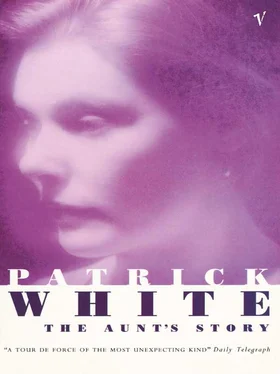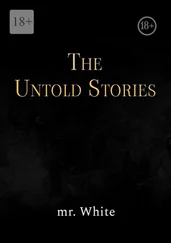‘I did not ask anyone else,’ said Huntly Clarkson, ‘because you didn’t suggest you wanted them.’
‘How not suggest?’ she said, dazed by the noises the silver made on the table. ‘At the time I was a blank. You have read things off me that were never there. Really. I assure you.’
But there was a kind of ease between them. She began to think that it might be a pleasant thing, a friendship with Huntly Clarkson, if she could resist his house, his servants, and his furniture. These were all magnificently assured. They fixed time in the present. Even the old things inherited from grandfathers and aunts, even these pandered to Huntly Clarkson and the present, as if they began and ended as part of his upholstery. She looked at the rich, shining, well-covered body of Huntly Clarkson and wondered if he would exist without his padding.
‘When you are not the solicitor I know, what do you do?’ she asked.
‘I enjoy myself,’ he said. ‘It would be tempting to do this all the time. If one hadn’t a kind of puritan misgiving. But outside this I succeed very well. I eat rich food. I smoke cigars. I go on an average of once a week to the races. I give dinner parties, which are sometimes boring, but there is always the spectacle of smart women with bare shoulders and diamonds.’
‘I have never done any of these things,’ said Theodora. ‘I wonder why you have asked me?’
‘That is why,’ Huntly Clarkson said.
He laughed, but as if he were a little puzzled by his cleverness. As if he had thought that he knew, and then discovered he did not.
‘I collect,’ he said, ‘unusual objects. I have the signatures of four English kings. I have the breviary of Maximilian of Mexico and a ball of hair that was cut out of the stomach of a cat.’
Then she laughed, too, because he made her warm and dashing, almost as if her shoulders were bare, and she flashed like a spray of diamonds.
‘I see,’ she laughed, ‘there is very little you haven’t got.’
‘Yes,’ he agreed. ‘And the odd part of it is, I am perfectly happy.’
He bent forward to confide, so that she looked into his well-shaved skin, and smelled the smell of rich, urbane men, which was new to her. Huntly Clarkson described happiness, and it was something you could touch. She drew back a little, almost afraid he might expect her to. But it was very delightful, and afterwards, sitting on the veranda, in a lull of wine, when the little fox terriers came, jumping, flirting, flashing, worrying, and prancing on their thin white wooden legs.
‘I hope you will come often,’ Huntly Clarkson said. ‘I would like you to meet my friends.’
It brushed cold along her skin. To sit alone in the drawing-room surrounded by the bare, diamond women.
‘I would never be very good at these things,’ said Theodora Goodman.
‘Just as you think,’ he said.
But she was sad, because she could feel that he had sat back.
And he had. He felt that he had eaten too much. He was bored by dogs, and the prospect of the office, and Theodora Goodman. Why had he asked Theodora Goodman to his house? If it was out of pity it was praiseworthy. He often did praiseworthy things. But he was tired of himself. He wanted to loll right back and listen to something extraordinary as he fell asleep.
‘Have you ever seen a volcano?’ she asked. ‘I would like to sail past in a ship, preferably at night.’
He opened his eyes.
‘Why, yes,’ he said. ‘I have seen Vesuvius and Etna. And Stromboli. That from a ship. They were not so very extraordinary. None of them,’ he said.
The green blaze of laurels crackled. Now she knew that she would go. It was easier to escape than she expected, from where she had never belonged.
But it settled down into being one of those relationships it is difficult to explain, a kind of groove in which minds fit, though not visible from outside. This persisted for some years.
‘Theo and Mr Clarkson see quite a lot of each other,’ hesitated Mrs Ewart hopefully.
‘Theodora and Mr Clarkson,’ said Mrs Goodman, ‘are friends. Though why, it is difficult to say. Theo is an admirable girl, although I am her mother, but not of Huntly Clarkson’s world.’
Oh, no. Mrs Goodman, even at her age, sat erect. She sat perpetually at a dinner table. She could have acted so many lives so much better than the actors. For this reason she resented the voice of Huntly Clarkson asking for Theodora on the telephone.
If reasons were not within the grasp of Mrs Ewart or Mrs Goodman, nor were they altogether apparent to Huntly Clarkson or Theodora Goodman themselves. I suppose, said Theodora, if I responded to clothes it would be something the same. All the rich and sinuous sensations of silk and sables would not have been unlike the hours spent with Huntly Clarkson, which smelled of cigars, and brilliantine, and leather. The sensations that Huntly Clarkson gave were no less voluptuous for being masculine.
‘Theodora,’ Huntly Clarkson said, ‘let us go to the races, let us lunch at a hotel.’
She watched them stand champagne in silver buckets.
‘I believe you are not impressed,’ said Huntly Clarkson.
‘No,’ she said. ‘I am the soul of shabbiness.’
But her mouth denied what sometimes she would have accepted. The world was plated, after all.
If Huntly Clarkson invited Theodora again, and often he said he would not, that it gave no return, he invited her because of some indefinable uneasiness and discontent, a sense of something that he had not yet achieved. This was in no way connected with what the eager and the innocent would call love. Shaving himself in his undervest on those clear, fine aggressive mornings, when the flesh feels firmer, less fat, Huntly Clarkson laughed. It was not love. Huntly Clarkson had loved as far as he was capable, and finished. Love and Theodora Goodman were, besides, grotesque, unless you were prepared to explore subtler variations of emotion than he personally would care for. Standing in his well-planned bathroom, he shaved his face thoughtfully. He listened to the rasp of the razor on the surface of his skin and admired the clean passage it made through the soap.
Huntly Clarkson did not go to church. He collected pictures, for their value. Sometimes he listened to music, but as a logical stage in developing the evening after dinner. If he experienced malaise, he usually put it down to physical condition. He took things for it. But when, in the midst of his well-planned bathroom, on a clear, clean, sharp morning, shouting with nickel taps, his mind pursued the foggy paths, out of the sun, in all elusiveness, he did not turn to bottles. He chose the telephone. I shall go when I have shaved, he said, and subject myself once more to Theodora Goodman. I shall catch on to the dry thread of her voice, that does not compensate. I shall subject myself, he said, that is the word. But if he felt less complacent, he also felt relieved.
Sometimes on the telephone he still attempted even to buy her with brilliance.
‘And by the way,’ said Huntly Clarkson, ‘you will come on Tuesday. To dinner. To help with Moraïtis.’
From behind her diffidence Theodora said she would. It was touching and amusing, though unconvincing, to be reminded one is indispensable. But this, she said, is the convention in which Huntly lives. The same voice would speak the same words to Marion Neville and Elsa Boileau, summoning them to some imaginary rescue, and this was commonly called charm. So Theodora armed herself with irony. She would go. She would sit just outside the blaze of diamonds, assisting at a social function, the dinner for Moraïtis, who would give a series of four concerts, to which Marion Neville and Elsa Boileau, who loved music, would go. Theodora probably would not. She had entered a stretch of years in which she chose flatness.
Читать дальше












